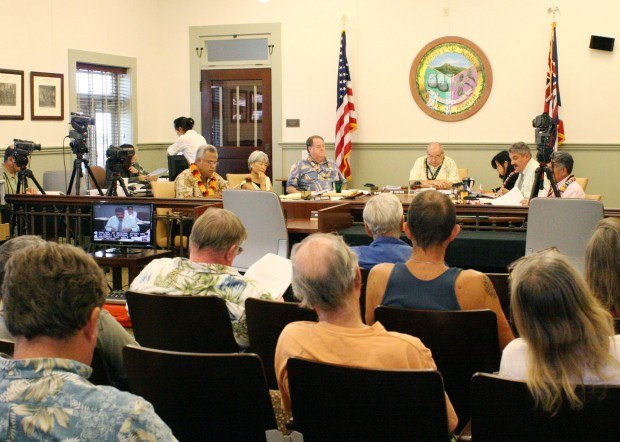LIHU‘E — The Kaua‘i County Council on Wednesday sent a clear message to state legislators and Gov. Neil Abercrombie: Repeal Act 55. Kaua‘i is now the second county in Hawai‘i to take an official stance against Act 55, after Big
LIHU‘E — The Kaua‘i County Council on Wednesday sent a clear message to state legislators and Gov. Neil Abercrombie: Repeal Act 55. Kaua‘i is now the second county in Hawai‘i to take an official stance against Act 55, after Big Island’s county council passed a similar resolution Sept. 18.
It took about two hours of public testimony, discussion and questioning at the council chambers for the council to reach an unanimous decision on a resolution asking for the repeal of the controversial act, which has gathered overwhelming opposition in the last few weeks. Immediately after Council Chair Jay Furfaro’s vote — the last to cast “aye” on a roll call — approximately 20 people who attended the meeting gave the council a rare standing ovation.
“I probably couldn’t have a conversation around the table about this act without having to cover the poi bowl,” said Furfaro on his closing statements, making a reference to the traditional Hawaiian cultural practice of halting all conflict at the dinner table whenever the poi bowl was uncovered.
“This bill basically says that we shall exempt the state from the statutes, ordinances, charter provisions, from rules of any government agency; and that is not a call I take my kama‘aina stewardship,” he said.
On May 20, 2011, Abercrombie signed Act 55, following the state Legislature’s approval of Senate Bill 1555. Act 55 created the Public Land Development Corporation and gave its five board members broad powers to allow development on public lands — including 1.8 million acres of ceded lands — while circumventing county zoning laws.
The intention was to generate additional revenues for the state Department of Land and Natural Resources, which Councilwoman Nadine Nakamura said has been hit with a 65 percent budgetary cut in the last 10 years.
Resolution 2012-52, asking for the repeal of Act 55, was introduced by Councilman KipuKai Kuali‘i, who gave an emotional closing statement prior to his vote.
“The state of Hawai‘i is responsible to protect our ceded lands and the resources that it contains,” he said. “Native Hawaiians clearly have continuing interest in claim to the ceded lands.”
The Hawai‘i Supreme Court agrees with it, and any further diminishing of the ceded lands will negatively impact reconciliation efforts between Native Hawaiians and the state, according to Kuali‘i.
“The PLDC fails to require an analysis of how Hawaiian traditional and customary practices will be protected in advance,” he said.
Sen. Ron Kouchi, D-Kaua‘i, Ni‘ihau, said at a meeting in Lihu‘e Tuesday morning that when he voted for the act at the state Legislature, the primary focus was on developing O‘ahu’s Ala Wai Harbor and Aloha Tower. He also said that looking in retrospect, Act 55 may need corrections on some items that were overlooked.
Council Vice Chair JoAnn Yukimura said at the council meeting Wednesday the state has other ways to receive approval for projects, without needing Act 55, which is a tool to fast-track projects.
Councilman Mel Rapozo said if the intention of the act was to save money, the state should not be spending money. The PLDC’s Executive Director, a job held by Lloyd Haraguchi, gets paid $130,000, according to Rapozo.
Nine people testified at the council chambers. All of them wanted a repeal, but a few offered suggestions for a contingency plan, such as amending the act to exclude pristine wildlands from PLDC’s reach.
Former council member, former state senator and current head of the state Office of Environmental Quality Control, Gary Hooser, asked for a complete repeal of Act 55. Hooser, speaking on his own behalf, said there should no contingency plan. If amendments are suggested, he said, at the end of the day there will be minor changes, basically aimed at convincing the public of the intent of the law, but with no impacts at protecting pristine lands from development.
By circumventing the permitting process at county and state agencies, state environmental laws would lose most of their strength, because the OEQC, the agency which oversees Environmental Impact Statements, depends on other agencies’ comments and permits to uphold up the law.
“I believe this county, you folks and our community, should send the strongest possible message … that this is unacceptable,” said Hooser, adding that despite Abercrombie publicly saying he would veto any repeal by the Legislature, he believes otherwise. It would be very contentious, provocative and a big mistake from the governor to veto a repeal, given the clear community outrage and pressure to repeal Act 55, Hooser said.
Asked if his position against Act 55 compromised his job as the head of OEQC, to which he was appointed by Abercrombie, Hooser said that by law he couldn’t be forced out of office except for probable cause. Hooser is currently on leave from his state job and campaigning to return to the council body.
Others who testified on behalf of the resolution were Rich Hoeppner, Glenn Mickens, Hope Kallai, Sandra Hurdon, Ken Taylor, Felicia Cowden, Ray Catania and Wendy Raybeck.
Nakamura said she sees the other side of the story, an opportunity to restore funding to DLNR. But she had concerns with the broad reach of Act 55, which has no standards in place to address its impacts.
Councilman Tim Bynum also said he had some serious problems with the act because it’s very broad.
Rapozo said there are many flaws with PLDC.
Councilman Dickie Chang said Kaua‘i’s message will be heard loud and clear around the state.
“I’m very proud of the Kaua‘i community rising up to say no,” Yukimura said.


